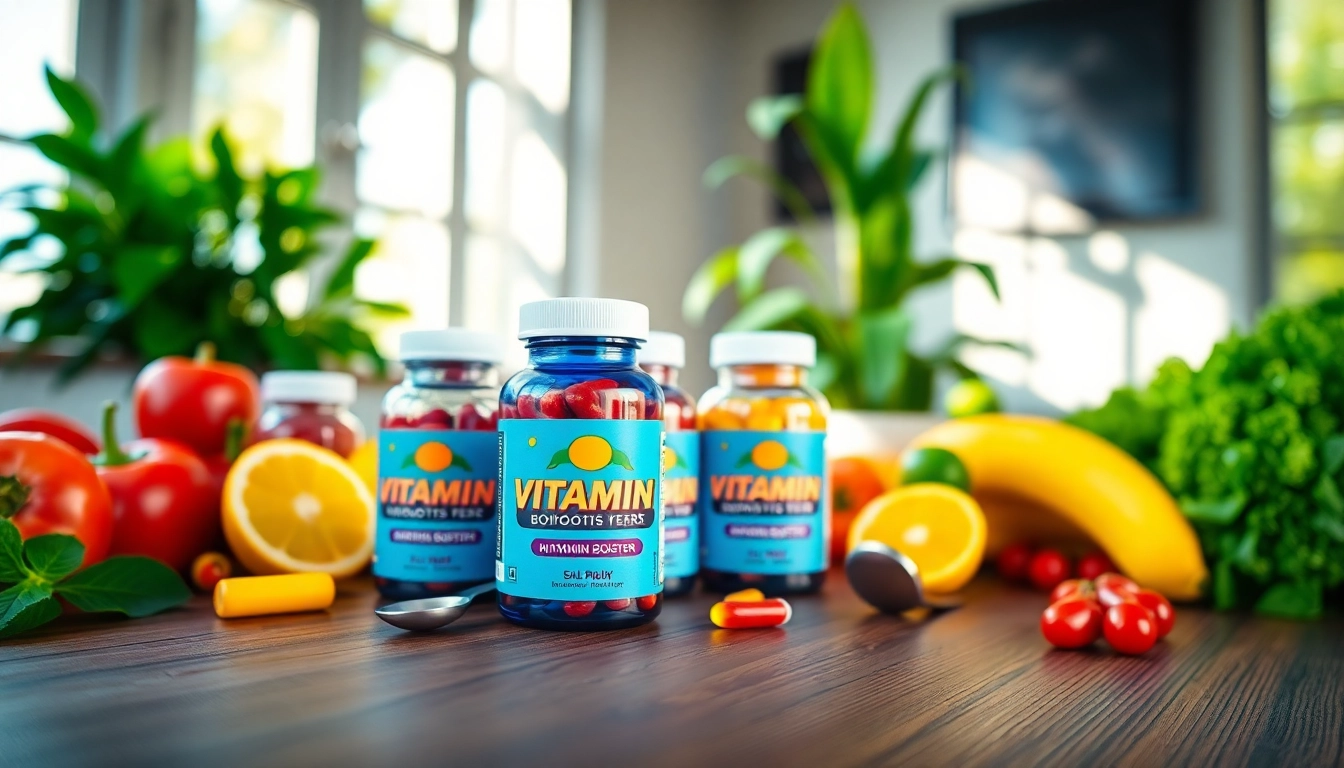Understanding Vitamin Boosters
What Are Vitamin Boosters?
Vitamin Boosters are concentrated supplements designed to enhance the intake of essential nutrients. These boosters come in various forms, including pills, powders, and liquids, enabling individuals to tailor their vitamin intake according to specific health needs or deficiencies. They are particularly useful for people who may struggle to consume adequate vitamins through their diet alone due to lifestyle choices, health conditions, or dietary restrictions. By incorporating Vitamin Boosters into your daily routine, you can help ensure you meet your nutritional goals and support overall health.
Key Nutrients in Vitamin Boosters
The composition of vitamin boosters can vary significantly, depending on the health benefits they target. Some key nutrients often found in vitamin boosters include:
- Vitamin C: Known for its immune-boosting properties, Vitamin C is crucial for the repair of tissues and enzymatic production of certain neurotransmitters.
- Vitamin D: Essential for bone health, it aids in calcium absorption and plays a role in immune function.
- Vitamin B Complex: This group of vitamins supports energy metabolism, red blood cell production, and overall brain health.
- Zinc: An important mineral that contributes to immune health and the maintenance of skin integrity.
- Vitamin E: Acts as an antioxidant and helps in maintaining healthy skin and eyes, as well as supporting the immune system.
How Vitamin Boosters Function in the Body
Vitamin boosters work by replenishing the body’s nutrient levels, enhancing physiological functions that require these essential vitamins and minerals. For instance, Vitamin C acts as a powerful antioxidant, protecting the body from free radical damage, while Vitamin D regulates the immune response. Each nutrient in a booster contributes to a holistic approach to health, ensuring that biochemical processes operate efficiently. By providing the body with concentrated doses of these vital nutrients, boosters can result in improved energy levels, better immune responses, and enhanced overall well-being.
Benefits of Vitamin Boosters
Boosting Immune Health with Vitamin Boosters
The immune system plays a critical role in protecting the body from illnesses. Vitamin boosters enriched with immune-supporting nutrients like Vitamin C, Vitamin D, and Zinc enhance the body’s natural defenses. Regularly taking these boosters can help reduce the risk of infections, speed up recovery times, and improve overall immune function. Research has shown that adequate intake of these vitamins is linked to decreased inflammation and a more robust immune response.
Improving Energy Levels Through Vitamin Boosters
Fatigue often results from nutrient deficiencies, particularly B vitamins, which are essential for energy production. Utilizing vitamin boosters can provide an immediate source of these vital nutrients that stimulate cellular energy production. Ingredients such as Vitamin B12 and Iron can help combat tiredness and improve physical and mental stamina. Consequently, individuals may experience increased productivity and focus throughout their day.
Supporting Mood and Mental Health with Vitamin Boosters
Vitamin deficiencies can contribute to mood disorders and mental health issues, making vitamin boosters an essential part of mental wellness. Nutrients like Folate (Vitamin B9), Vitamin D, and Omega-3 fatty acids play a significant role in brain function and mood regulation. For instance, low levels of Vitamin D have been linked to seasonal affective disorder and other mood-related disorders. Thus, incorporating vitamin boosters into daily routines may help mitigate these effects and support emotional health.
Types of Vitamin Boosters Available
Natural vs. Synthetic Vitamin Boosters
Vitamin boosters can be categorized into natural and synthetic types. Natural vitamin boosters are derived from whole food sources and are often preferred due to their bioavailability and fewer side effects. Examples include whole food powders and extracts that preserve the complex nutrient profile of food sources. On the other hand, synthetic boosters contain man-made nutrients that might be less effective or may carry different health implications. It’s essential to understand your dietary needs and choose the type that best aligns with your health objectives.
Vitamin Booster Categories: Water-Soluble vs. Fat-Soluble
Understanding the categories of vitamins can help optimize the effectiveness of your vitamin boosters. Vitamins are divided into two categories: water-soluble and fat-soluble. Water-soluble vitamins, including Vitamin C and all B vitamins, are not stored in the body and need to be replenished regularly. Fat-soluble vitamins—such as Vitamins A, D, E, and K—are stored in the body’s fatty tissues and liver, making it important not to consume them excessively. Selecting vitamin boosters that consider these categories can help ensure that you are not consuming too much or too little of essential vitamins.
Choosing the Right Vitamin Boosters for Your Needs
When selecting vitamin boosters, consider factors such as age, diet, health status, and lifestyle. For example, older adults may benefit from Vitamin D and B12 boosters, while athletes may seek out Vitamin C and complex B vitamins for energy and recovery. Additionally, pregnant or breastfeeding women will have specific nutritional needs that can be addressed with targeted vitamin boosters. Consulting healthcare providers or nutritionists can provide personalized recommendations to help you choose the best vitamin boosters for your specific circumstances.
Incorporating Vitamin Boosters into Your Lifestyle
Best Practices for Taking Vitamin Boosters
To maximize the benefits of vitamin boosters, adhere to best practices, including:
- Follow Dosage Guidelines: Always adhere to the recommended daily allowances or the guidance of a healthcare practitioner when taking supplements.
- Take with Food: Consuming fat-soluble vitamins with meals that contain healthy fats can enhance absorption.
- Consistency is Key: Make taking vitamin boosters part of your daily routine to see gradual improvements in your health.
Complementary Foods to Pair with Vitamin Boosters
Pairing vitamin boosters with specific foods can enhance nutrient absorption and overall effectiveness. For instance, Vitamin D is better absorbed with fatty foods like avocados, while iron supplements are most effective when taken with Vitamin C-rich foods. Including a variety of whole foods in your diet can support the function of vitamin boosters by providing additional nutrients and enhancing overall health.
Common Mistakes to Avoid with Vitamin Boosters
There are several common mistakes individuals may make when using vitamin boosters, including:
- Over-Supplementation: Many people assume that more vitamins equate to better health; however, excess intake can lead to toxicity, especially with fat-soluble vitamins.
- Ignoring Dietary Sources: Relying solely on supplements instead of maintaining a balanced diet can lead to nutritional imbalances.
- Not Consulting Professionals: Failing to seek guidance from healthcare professionals can result in taking unnecessary or harmful supplements.
Measuring the Effectiveness of Vitamin Boosters
Signs that Your Vitamin Boosters are Working
Determining the effectiveness of vitamin boosters can sometimes be challenging but can be recognized through various indicators. Improved energy levels, enhanced mood, better immune responses, and overall feelings of well-being often suggest that the boosters are having a positive effect. Regular health check-ups can also help in assessing levels of vital nutrients in your system.
Tracking Your Health Improvements with Vitamin Boosters
Keeping a health journal can be invaluable for tracking your improvements as you incorporate vitamin boosters into your routine. Record aspects such as energy levels, mood fluctuations, recurrence of illnesses, and any overall changes in your health. This documentation can help you and your healthcare providers make informed decisions regarding your vitamin intake and adjustments.
Consulting Health Professionals About Vitamin Boosters
Consulting with healthcare professionals is crucial, especially when considering vitamin boosters. They can provide tailored advice based on your personal health history, dietary habits, and specific health goals. Blood tests may also be recommended to assess nutrient levels before starting any new supplementation regimen. Engaging health professionals ensures that any action taken is rooted in evidence-based practices and supports your desired health outcomes effectively.



